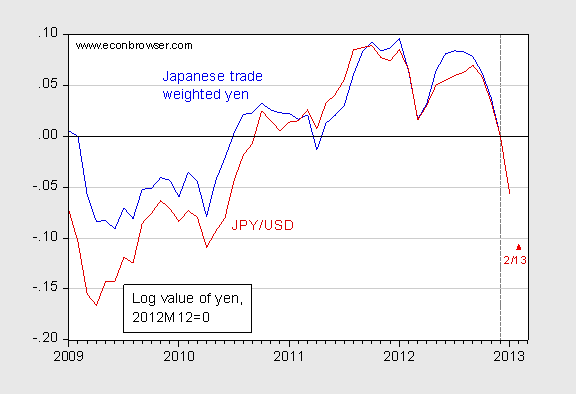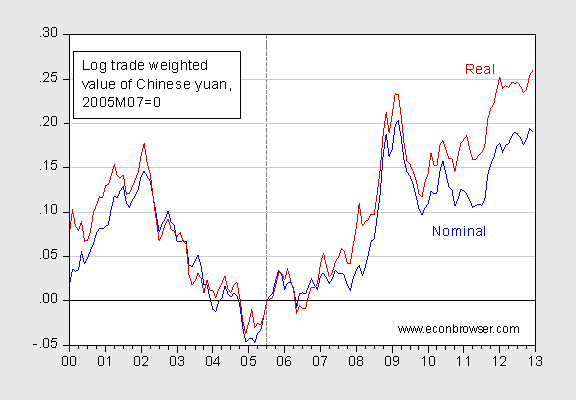Thinking about what is driving — and will drive — the yen

Figure 1: Log trade weighted value of yen against broad currency basket (blue), and JPY/USD exchange rate (red), both normalized to 2012M12=0 (election of Abe). Smaller values denote weaker yen. Source: BIS, Fed via FRED, and WSJ.
From WSJ (2/13):
Japan’s new economic policies are expected to be widely discussed at this weekend’s meeting of the Group of 20 finance ministers in Moscow. This week saw rocky trading in the yen after a series of conflicting reports about whether the smaller Group of Seven nations were supportive of Mr. Abe’s policy. After global criticism, Mr. Abe and his advisers have toned down their talk about weakening the yen. Instead, its central bank has promised a significant new easing in monetary policy by buying bonds—similar to strategies enacted by the U.S. Federal Reserve and the European Central Bank—which policy makers say is aimed at ending Japan’s long bout of deflation and often has the side effect of lowering a currency.
The Efficacy of Sterilized versus Unsterilized Forex Intervention
This clarification of potential policy measures – and the ruling out purchases of foreign currency – follows fears that Japan would directly intervene in foreign exchange markets. I think the debate over intervention is interesting, in light of what we used to think about exchange rate determination. For instance, in the old days (pre-2008), economists debated whether sterilized foreign exchange intervention alone could have a lasting effect on exchange rate values, often coming down on the negative side.[0] And yet, now most discussions take it for granted that Japan, a developed country with full currency convertibility, can successfully intervene to weaken the yen.
Of course, in the old days, we typically thought of government bonds as perfect substitutes so that (sterilized) foreign exchange intervention which left the money supply unchanged had no impact. Now, presumably, we no longer believe government bonds are perfect substitutes, possibly because of differential default risk. That doesn’t necessarily mean that actual or expected (sterilized) intervention can have a quantitatively large impact. (If it’s unsterilized, then it will have an impact, but not necessarily larger than any other money base increase.)
(Incipient) Measures for Currency Depreciation
It’s important to recall that Japan has thus far not undertaken any actual changes, save signalling. If and when Japanese policymakers do take action, the channels by which the measures have an impact on the exchange rate could be pretty standard: increased bank reserves leads to greater money supply, extended policy rate guidance (along with the newly established 2% inflation target) [1] implies eventually higher inflation, or credit easing leads to higher economic activity that in turns leads to higher inflation. (Interestingly, the mean expected inflation rates in 2013 and 2014 from the Economist poll of forecasters have not budged from approximately zero since the November 2012 survey.)
As I noted previously, in the last case, it’s unclear to me what the net effect over time is, since higher output would tend to appreciate the currency –- of course that takes place eventually, rather than right away. Stimulating the economy takes on heightened importance, given the report that the Japanese economy shrank again in Q4, by 0.4% (q/q annualized). (The first two cases have pretty unambiguous effects, albeit of quantitatively unknown magnitude.)
Accidental G-7 Wide Reflation?
While I understand that shifts in exchange rates complicate policy makers’ lives (particularly in the euro area [2]), to some extent I think that competitive depreciations can lead to a desirable outcome insofar as it leads to a modest global (or at least G-7 wide) acceleration of inflation.[3] [4] [5]
Where the real conflict will come is in the G-20 forum. [6] There it is not so clear at all that China and the rest of the emerging market economies need higher inflation. Rather, they need to continue to allow their currencies to appreciate in order to prevent overheating. We shall see if they follow this path — hope springs eternal.

Figure 2: Log value of nominal trade weighted Chinese yuan against a broad currency basket (blue), and real value (red), normalized to 2005M07=0 (de-pegging of yuan). Smaller values denote weaker yuan. Source: BIS.
In “Currency War or International Policy Coordination”, Barry Eichengreen succinctly summarizes the current situation as compared against that of the 1930’s:
…when the U.S., the Eurozone, the United Kingdom and Japan once again all experienced broadly similar deflationary pressures, quantitative easing bringing about some currency depreciation was again an appropriate symmetrical response. More focus on first-best monetary measures would again have been better, and international coordination of monetary easing might again have reduced uncertainty, although how much difference this would have made is, once more, an open question.
The difference in the recent episode is the presence of a second group of economies that were not affected symmetrically. Emerging markets were worried about inflation rather than deflation and about currencies, asset prices and, in some cases, growth rates that were too strong rather than too weak. Their first-best response was fiscal tightening. International coordination of monetary easing in the advanced countries with fiscal tightening in emerging markets would have been better, although once again how much better is a matter for debate. More concentration on first-best fiscal measures appropriate for countering over-strong demand, overheated growth, overvalued currencies and inflation and less recourse to second-best interventions like trade and capital controls, this time too, would have been better still. But once again binding political constraints prevented full recourse to first best measures. And once again they made effective international coordination impossible to achieve.
Update, 8am Pacific, 2/16: See also Greg Ip/Free Exchange and Tim Duy.
Menzie,
Is Abe’s promise to increase fiscal stimulus via large scale infrastructure programs having any impact on the yen??
Currency Wars to Create More Troubles Ahead
As countries around the world struggle to grow in 2013, central banks in the global economy are in a race to devalue their currencies. This is one race I predict will end with a bunch of losers.
When meeting in Moscow on behalf of the G20, those honourable Ladies and Gentlemen may use the subway to go to their matters of the day. In doing so, they will be reminded by a very polite Russian audio recorded voice, of the name of the next station, and not forget their belongings. A heavy suitcase for the least:
An equilibrium model of « Global imbalances » and low interest rates.
Theory or model that was overstretched to the extent that it required carry trade in Yen/USD or Yen /euros to manipulate bonds and equities markets. An overvalued USD and Yen/euro ensued, the net off of Bonds risk premium between the debtors countries and the rest of world. All are those belongings of the years 2000 2008, G7 and G20 were numerous.
No comparison with 1930 since the G7 balance of payment and current accounts are for most of their constituent negative. Fred data are showing that an interest premium was existing between Europe long term bonds and the USA.
Few graphics to illustrate the contemporary situation and to question the certitudes on the remedies and the relevance of a particular subject:
Federal Surplus or Deficit [-] (FYFSD) Fred data 1895-2015
U.S. / U.K. Foreign Exchange Rate (DEXUSUK) 1970- 2015
Interest Rates, Government Securities, Treasury Bills for Japan (INTGSTJPM193N
http://research.stlouisfed.org/fred2/series/INTGSTJPM193N
Interest Rates, Government Securities, Government Bonds for Germany (INTGSBDEM193N
http://research.stlouisfed.org/fred2/series/INTGSBDEM193N
The JGB holdings are not in the hands of household investors but the pension funds, banks and life insurance are sharing the bulk of the market.P7
http://www.mof.go.jp/english/jgbs/publication/newsletter/jgb2012_04.pdf
Some congestions, some inflation and a little discomfort in few accounts and portfolio.
On a scientific mode, a need to see Mundell quadrant 4 to be solved, and Cauchy, Fourier mathematical sequences to be stretched and tested.
Menzie wrote:
While I understand that shifts in exchange rates complicate policy makers’ lives (particularly in the euro area, to some extent I think that competitive depreciations can lead to a desirable outcome insofar as it leads to a modest global (or at least G-7 wide) acceleration of inflation.
Has anyone ever demonstrated that inflation is a good thing? Actually just the opposite has been demonstrated from Tulips in Holland to John Law’s adventures in France to Germany after WWI. Yet if the truth of inflation being a bad thing is recognized this sentence is absurd. It is based on an assumption that inflation is good. It is based on inflationism.
In command economies run from the ivory towers of government it is an understatement to say that shifts in exchange rates complicate matters, yet the fact that inflation is the most prominent factor in shifts in exchange rates seems to be lost by assumption.
The truth of this statement is that it speaks truth to ignorance. Central planning policy makers never have enough knowledge to run an economy and additionally every one of their decisions complicates the matter. Central planning is a failure from the start and its errors are only complicated by the impacts of the decisions and policies put into place.
@Ricardo
Inflation was helpful after World War Two.
“Central planning policy makers never have enough knowledge to run an economy and additionally every one of their decisions complicates the matter.”
Sounds like Austrian speak to me. The fact is that central planning policy makers have done pretty well in the U.S. since the Great Depression. It was only recently when thing were left more and more to the market that things went awry again and central planning policy makers were forced to intervene heavily in the economy and bail out the private sector.
Peter,
Don’t let them dupe you. Think for youself. Consider, the number of pages to the federal register increased or decreased? (A hint, only Ronald Reagan reduced the pages) Has the number pf pages of the tax code increased or decreased? Is Social Security or Medicare getting more complicated or less complicated? Is government health care becoming more or less complicated? Can you name one congressman who understands the tax code or the new health care bill?
Peter, don’t drink the Koolaid.
Inflation is just another way for some firms, mostly financial, to capture rents from the rest of us. Wages never keep up. That’s why it has the illusion of “working,” since firms are able to raise prices before wages catch up. As a policy it should be labled macro economic fraud, clearly highly unethical. Even Marx smelled the evil. Economics has become extremist political. Because the Chicago school came up with “rational expectations”, the left-leaning economists had to take an opposite stance, defending these horrible rent-producing policies. In a sense, this is kind of reverse psychology: The rich like the Koch’s fund research which shows govt spending and inflation are bad, even though we all know, as they do, that is clearly not true for them. So they get more. Gotta love politics.
Wouldn’t a Mundell-Fleming model posit China and the other EMs allow modest strengthening of their currencies via sterilization, and use fiscal policy to stimulate domestic demand?
markets.aurelius: Yes; see this post.